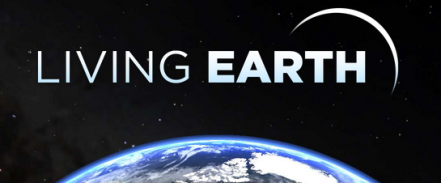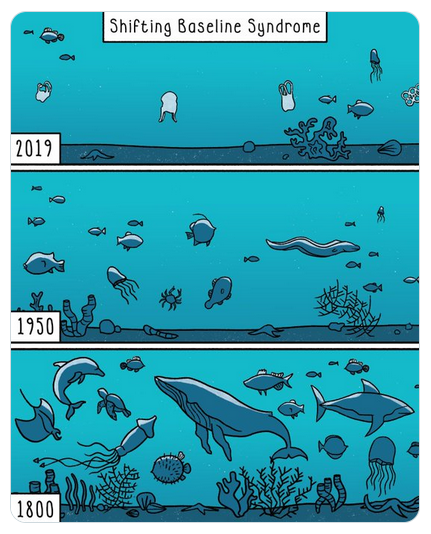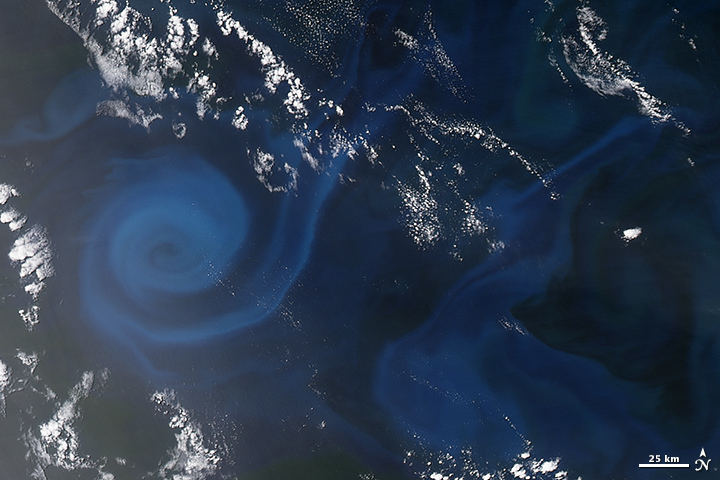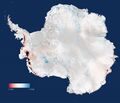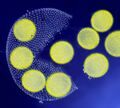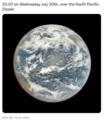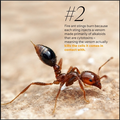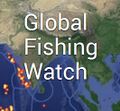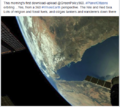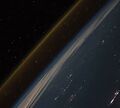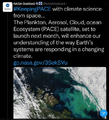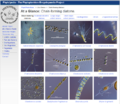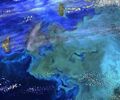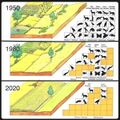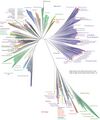Category:Ocean Sustainability
A Generational Challenge
- To Preserve and Protect Life on Planet Earth
Vanishing Fish: Shifting Baselines and the Future of Global Fisheries
by Daniel Pauly / May 2019
Daniel Pauly and George Monbiot in conversation about “shifting baselines syndrome”
More about Daniel Pauly and Shifting Baselines
Anecdotes and the shifting baseline syndrome of fisheries by Daniel Pauly - 1995
🌎
The Oceans and the Ocean Food Chain
- Begin with Phytoplankton
"The Tiny Little Ones" ...
- Nearly all marine plants are single celled, photosynthetic algae-plankton
○ ○ ○ ○ ○ ○ ○ ○ ○ ○ ○ ○ ○ ○ ○ ○
Blue-Green Connection to Life on Earth
- "A single kind of blue-green algae in the ocean ('Prochlorococcus') produces the oxygen in one of every five breaths we take"
- "The World Is Blue: How Our Fate and the Ocean’s Are One"
- "I see things that others do not..." 'Mission Blue' (preview)
- ○ ○ ○ ○ ○ ○○ ○ ○ ○ ○ ○ ○ ○ ○ ○
Ocean's hidden world of plankton revealed in 'enormous database'
Researchers have found that many of the plankton organisms, particularly the bacteria, are sensitive to temperature.
"It is temperature that determines what sort of communities of organisms we find. If we look at our data and we see what organisms are there, we can predict with 97% probability the temperature of the water they are living in.
"These organisms are most sensitive to temperature, more than anything else, and with changing temperatures as a result of climate change we are likely to see changes in this community."
The researchers say that this scientific analysis is just the beginning.
They are making their findings freely available to the scientific community to gain a better understanding of this vital but unseen underwater world.
"The amount of data we have released is already enormous; it is one of the largest databases of DNA available to the scientific community. But we've analysed perhaps 2% of the samples we have collected throughout the world - so there is a huge amount of work to do in the future to understand even more about the functioning of these marine ecosystems and the importance of that for the wellbeing of the planet.
- Origins of the Marine Food Chain
○
Subcategories
This category has the following 3 subcategories, out of 3 total.
O
P
W
Pages in category "Ocean Sustainability"
The following 33 pages are in this category, out of 33 total.
E
G
- Google Earth
- Green Stories of the Day
- GreenPolicy360 Archive Highlights 2013
- GreenPolicy360 Archive Highlights 2014
- GreenPolicy360 Archive Highlights 2015
- GreenPolicy360 Archive Highlights 2016
- GreenPolicy360 Archive Highlights 2017
- GreenPolicy360 Archive Highlights 2018
- GreenPolicy360 Archive Highlights 2019
- GreenPolicy360 Archive Highlights 2020
- GreenPolicy360 Archive Highlights 2023
- GreenPolicy360 Archive Highlights 2024
Media in category "Ocean Sustainability"
The following 127 files are in this category, out of 127 total.
- 5 19 14 andrew antarcticaelevationchanges-640x547.jpg 640 × 547; 59 KB
- About Baselines and Change.png 592 × 312; 33 KB
- Algae release -nikon-small-world-competition-2017-winners.jpg 640 × 576; 89 KB
- Arctic sea ice watch 25 yrs of ice cover change.png 697 × 386; 314 KB
- Battle for Democracy.jpg 640 × 123; 24 KB
- Big Wobble 2020.jpg 507 × 342; 79 KB
- Blue-green phyto swirling 2015.png 357 × 605; 409 KB
- California's kelp forests and coastal biodiversity diminished.png 532 × 754; 307 KB
- Chasing Coral.jpg 800 × 437; 65 KB
- Citizens Climate Lobby - Save Our Future Act 2021.jpg 518 × 262; 77 KB
- Climate Goals off course - 2018.png 800 × 556; 214 KB
- Connect with Nature.png 405 × 280; 17 KB
- CopernicusEU - Sentinel5P Atmosphere Monitoring Mission - 2.jpg 795 × 1,477; 654 KB
- CopernicusEU - Sentinel5P Atmosphere Monitoring Mission.png 583 × 465; 222 KB
- Cyanobacteria Prochlorococcus worldmapping MIT.jpg 473 × 321; 60 KB
- DSCOVR EPIC - July 20 2022.png 532 × 612; 315 KB
- Earth AI - Feb 2022.png 482 × 480; 192 KB
- Earth Information Center - 2022 Graphic NASA.png 800 × 981; 868 KB
- Earth Information Center from NASA.jpg 800 × 577; 94 KB
- Earth Observing System - fleet of satellites.png 740 × 576; 557 KB
- Earth POV from the ISS Cupola-m.jpg 800 × 480; 71 KB
- Earth Research Findings 2015 1.png 1,088 × 686; 1.49 MB
- Earth Research Findings 2015 2.png 1,088 × 241; 512 KB
- Earth System Observatory-1.jpg 580 × 833; 129 KB
- Earth System Observatory-2.jpg 580 × 831; 69 KB
- Earth Viewing from the International Space Station.jpg 496 × 307; 45 KB
- Earth-science.png 265 × 83; 13 KB
- EarthDecadel Priorities-2018.jpg 779 × 529; 85 KB
- EnvirSecurity.png 558 × 166; 155 KB
- EO and Fire Ants in the US - on World Wildlife Day.png 768 × 811; 663 KB
- EPA Lee Zeldin Hearing - 1.png 600 × 693; 304 KB
- EPA Lee Zeldin Hearing.png 637 × 600; 414 KB
- Eukaryotic Cell SCU.jpg 716 × 1,024; 799 KB
- Fact Checking organizations at work.jpg 800 × 390; 44 KB
- Facts Count-WaPo Reports-19127 false-misleading claims in 1226 days.jpg 601 × 489; 100 KB
- Fire Ants.png 601 × 600; 603 KB
- Floating Forest Project .png 773 × 461; 932 KB
- Floating Forests-Kelp -- Oceanlight.jpg 720 × 480; 137 KB
- FOOD.jpg 983 × 311; 117 KB
- From Reid Wiseman Earth Ocean Patterns.png 941 × 578; 715 KB
- G Earth Outreach.jpg 800 × 412; 44 KB
- Global Biodiversity Information-Data.png 501 × 266; 124 KB
- Global Fishing Watch 2.jpg 266 × 247; 26 KB
- Global Warming Fact of the Day - March 22, 2025.jpg 600 × 599; 111 KB
- GP360 tagcloud2 m.png 531 × 324; 132 KB
- Great Barrier Reef severe bleaching die-off.png 704 × 388; 630 KB
- GreenPolicy360 - May- 9-2024.png 800 × 406; 119 KB
- Group on Earth Observations.JPG 546 × 418; 33 KB
- Haiku poems - Owl against a dusk sky - via Haiku Foundation.png 514 × 413; 144 KB
- Haikubox via RM citizen science.png 600 × 640; 466 KB
- How satellites monitor climate change circa 2016.png 599 × 327; 0 bytes
- INaturalist butterfly.jpg 1,024 × 683; 202 KB
- Joe Biden is projected winner Nov7-2020.jpg 343 × 120; 26 KB
- July 14, 2018 - hello down there.png 524 × 467; 290 KB
- Kelp NOAA credit Robert Schwemmer.jpg 450 × 299; 193 KB
- LANDSAT - NASA.jpg 622 × 415; 95 KB
- Landsat 9 about to launch.png 420 × 721; 355 KB
- Landsat 9 Launches - 1.jpg 600 × 693; 128 KB
- Landsat 9 Launches - 2.jpg 600 × 737; 250 KB
- Landsat memories.png 535 × 473; 159 KB
- Launch into Space.jpg 800 × 717; 50 KB
- Le Grand Bleu.png 738 × 1,107; 1.52 MB
- Living Earth.png 441 × 183; 106 KB
- Mapping the Earth with Google Earth Outreach.jpg 640 × 648; 109 KB
- March for Science-1.png 800 × 291; 596 KB
- Mares Kelp 3.png 903 × 476; 869 KB
- Mares Kelp.png 903 × 476; 532 KB
- MLT Geospace - the Edge.jpg 800 × 600; 22 KB
- Mushroom life in the forest.png 640 × 458; 626 KB
- NASA co2-graph-061219.jpg 800 × 500; 214 KB
- NASA EPIC DSCOVR - July 6 2015.png 768 × 956; 687 KB
- NASA Launch of Landsat 9 - Sept 27, 2021.jpg 675 × 772; 131 KB
- NASA's continuing vision and mission - as of 2005.png 640 × 414; 153 KB
- Nile River and Mideast.jpg 750 × 929; 87 KB
- Ocean acidification NOAA s.jpg 359 × 211; 24 KB
- Ocean acidification Oxford.png 487 × 601; 285 KB
- Ocean currents from GOCE 20141125-jpg.jpg 670 × 440; 90 KB
- Ocean Heat May 2015.png 714 × 400; 356 KB
- Ocean temps 20013-2012 NASA.png 360 × 745; 247 KB
- PACE - NASA Everything on Earth Is Connected.png 600 × 264; 70 KB
- PACE - NASA Jan 17 2024.png 600 × 662; 465 KB
- Philippe Cousteau at Bioneers Conf-2015.png 640 × 379; 452 KB
- Phyto glowing beauty of the oceans.jpg 480 × 265; 20 KB
- Phyto the Green Machine.png 640 × 465; 431 KB
- Phyto tinybluegreen.jpg 599 × 394; 58 KB
- Phytoplankton - the foundation of the oceanic food chain 560x396.jpg 560 × 396; 101 KB
- Phytoplankton - the foundation of the oceanic food chain m.jpg 720 × 508; 170 KB
- Phytoplankton - the foundation of the oceanic food chain.jpg 3,972 × 2,676; 5.44 MB
- Phytoplankton decline NASA study Sept2015.png 1,032 × 784; 522 KB
- Phytoplankton kamchatka NASA.jpg 720 × 360; 49 KB
- Phytoplankton-Phytopedia 2016.png 799 × 695; 732 KB
- Phytoplankton.jpg 600 × 600; 97 KB
- Planet home page-2022.png 800 × 400; 392 KB
- Planet m.png 533 × 222; 155 KB
- Plankton - phytoplankton m.jpg 773 × 558; 364 KB
- Plankton - phytoplankton.jpg 1,200 × 859; 955 KB
- Plankton Phytoplankton--'Climate Dance'.jpg 773 × 644; 161 KB
- Plankton story - New Yorker - Oct 2021.jpg 619 × 737; 125 KB
- Plankton swirl Jan 2015.jpg 720 × 480; 161 KB
- Plankton.jpg 400 × 259; 34 KB
- Planktonbluegreen tinyones.jpg 640 × 320; 99 KB
- Prochlorococcus blue-green.png 501 × 273; 86 KB
- Prochlorococcus blue-green.tiny ones.png 505 × 277; 130 KB
- Prochlorococcus featured at GreenPolicy360.png 497 × 642; 42 KB
- Protect the Natural World.jpg 800 × 345; 78 KB
- Rainfall-earthsciencefromspace.gif 530 × 299; 2.64 MB
- Rebecca Google Outreach.jpg 276 × 183; 9 KB
- Recent Satellite Imagery of Earth - via Azavea.png 600 × 747; 488 KB
- Seagrass florida keys-noaa.jpg 700 × 267; 65 KB
- Shifting Baseline Syndrome - threats to ecosystems biodiversity.png 431 × 534; 322 KB
- Shifting Baselines 2.jpg 600 × 600; 140 KB
- Space-Quarterly-Earth Observations NanoRacks.png 671 × 812; 956 KB
- Story telling and science education.png 515 × 480; 171 KB
- The Carbon Dioxide Theory of Climatic Change, by Gilbert Plass, 1956.jpg 798 × 1,202; 397 KB
- The Ocean Cleanup May2015.jpg 1,000 × 563; 39 KB
- The World Is Blue.jpg 340 × 499; 40 KB
- Thereisnoplanetb.com .jpg 940 × 198; 48 KB
- Thriving on Our Changing Planet.png 495 × 369; 244 KB
- Tiny Plankton - via The Guardian.jpg 591 × 181; 59 KB
- Tracking Biden's Environmental Record - WaPo - Feb 2021.jpg 766 × 326; 64 KB
- Tracking Biden's Environmental Record - WaPo listing - Feb 2021.jpg 588 × 397; 35 KB
- Tree of Life nmicrobiol201648-f1 via Nature.jpg 695 × 833; 98 KB
- Tree of Life on Hand.jpg 336 × 448; 70 KB
- Where is the heat - IPCC.jpg 800 × 451; 75 KB
